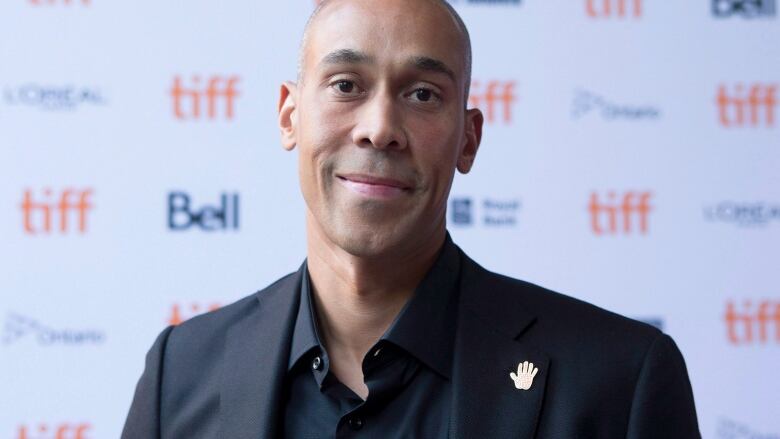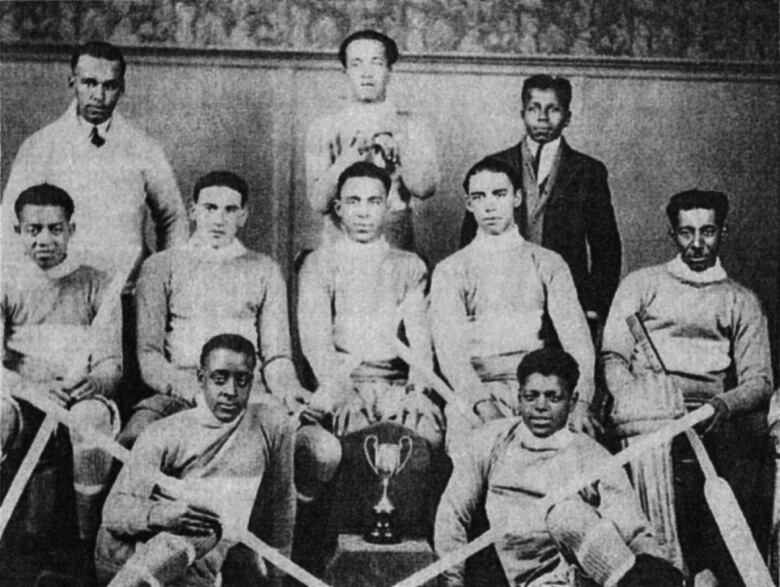Documentary on the Maritimes' Coloured Hockey League to begin filming
Rapper Drake and NBA superstar LeBron James are executive producers

A new documentaryabout the Coloured Hockey League is set to begin filming in the Maritimes this fall.
The film is called Black Ice, and is based on a book of the same name. NBA superstar LeBron James and Toronto rapper Drake areexecutive producers.
The Coloured Hockey League started in the late 1800sin the Maritimes because segregation wouldn't allow Black players to play the sportwith white players.The league ended inthe 1930s.
The director isOscar nominee Hubert Davis. He said he is looking to hear from descendants of the league to gather their stories and hear what their lives were like for the documentary and an educational website after the release.
To give more detailsaboutthe film,Davis spoke Tuesday morning with Portia Clark on CBC Radio's Information Morning.
The following interview has been edited for length and clarity.
You're very early in the filmmaking I understand, at this stage. What interests you most about this aspect of Canadian history and bringing it to a bigger audience?
I think I was drawn to the story because I had never heard it. I never heard of the Coloured Hockey League or the contribution or really that the time that the league was happening in.
I think I wassurprised and I thought, 'Oh, if you know, if I don't know this,I think that there's a lot of people out there who have no idea that this even existed.'
And so for a documentary filmmaker, I think that's always exciting.
It's atreasured part of history for African Nova Scotians. For you as a filmmaker,how do you bring it to life since, as I say, the Coloured Hockey League hasn't played for a very long time?
Yeah, it's always the challenge, you know,'How do we go back into history but make that history feel contemporary?'I think in telling the story of this league, what we're trying to do is in the rest of the documentary, find these parallels in thegame today.
And this idea that, hockey is a beautiful sport that really represents Canada, but if there are issues,of like,a history of a league thatreally didn't become mainstream or really become recognized, what are those other historical recognitions that have kind of gone unnoticed along the way? And how can we start to dive into some of that history as well?
And so as part of this, you speak with current NHL players, Black players about their experiences growing up in hockey and maybe even now?
Yes, that's exactly right.
We've been interviewing players, some players who are all different stages of their careers, some who are, you know,might have just been drafted into the NHL, some who have played in the NHL for10 years.
What we're finding is the commonality in their stories, their kind of love for the sport.
But then this idea of, you know, whether it's active racism or something that a coach said, we're finding all those stories kind of uncovered as we go.They're quite powerful in a way because I think there's such a deep-seated love for the sport [for them]to getas far as they have,that they've had with their families and commitment andput their lives into it.
But there is still a underlying racism that I think has not been really truthfully talked about in an open way.

When I look at photos of the Coloured Hockey League, the black and white photos, I think aboutwhat it would have been like for them to play at this time, but also about their lives, for these men, their families outside of hockey. What comes to mind when you think about how they were playing or the atmosphere that they were playing inthen as part of a segregated league?
It's so interesting becauseas Idelve into it, it seems likefrom the research I've done, there was a real pride in the teams and the community that was set up.
This real idea of self-determinism and decidingthey were going to kind of make this league and being so involved within the Black community out east.
So it's interesting in a way, and a lot of the coverage that we've read about it is in a positive light as well.And then there as they go and play in certain other places, then you start to see more outwardly racist commentary on the sport.
It really shows you that the geography of where they are and where they're playing and what's going on in that particular place, it doesn't really matter as much time as the place in the people, if that makes sense. I thought that was very interesting, so it doesn't matter if this was in 1900 or we're talking like 2021.
It's really depending on the people and the place. And I thought, like, it kind of counters this idea that, 'Oh, it's just progress like we're in this year now, so everything is better and we look back in history and everything has to be worse.'
I don't think that's necessarily true.
And are those some of the stories that you hope to hear from any descendants that you get in touch with is is what that was really like for those players that I mean, who are you looking for, Hubert?
Yeah, that's that's exactly what we're looking for is descendantsfrom the Coloured Hockey League.
Anyone who would have had a relative that would have played or knew of a relative or had any piece of artifact or photograph or old skate.
We're looking for the cup and the pictures that you see from the Coloured Hockey League. You'll see that they actually had a cup thatwent tothe winner of the league each year. And we still, we think it exists. We just don't know where it is. Maybe someone's got ittucked away in abasement closet somewhere.
We're looking for anyone who is connected to it in some way and can just shed a little bit more light on their stories.
I mentioned thebook, Black Ice, which the authors, the Fosty brothers, they started to make that into a film. This is a new project which has a connection to Drake and LeBron James and someone named Maverick Carter. Can you connect the dots for us?
Yeah, it's being executive produced by LeBron James and Drake, which isfabulous for the film.
That really, I think, brings a lot of eyes to it. And they reallyare great partnersin just getting exposure for it, and I think they've been working on some projects like this themselves.
It's really nice to like, have a collaboration of such. Global iconscan only help the film.
The documentary will come out of it, Hubert, but the team also wants to make it sort of an educational tool. What's being planned?
What we're finding is there's really so many stories, much more than we could fit into even a feature documentary.
What the plan is, is to build really a platform around the film so that there will be social, there's going to be a website. What we're really trying to key on is the educational tools that can come out of this.
This idea of rediscovering history and really looking at how racism works specifically in Canada. I think such an important piece of it that really got me excited about being involved in it is to look at how it works in this country and and really kind of unearth that.
The educational component forhaving screenings, we're also partnered with wScotiabank, who I know has a lot of grassroots outreach as far as screenings to communities.
That's just as important asthe documentary itself.
For more stories about the experiences of Black Canadians from anti-Black racism to success stories within the Black community check out Being Black in Canada, a CBC project Black Canadians can be proud of. You can read more stories here.

With files from Information Morning Nova Scotia












_(720p).jpg)


 OFFICIAL HD MUSIC VIDEO.jpg)
.jpg)



























































































